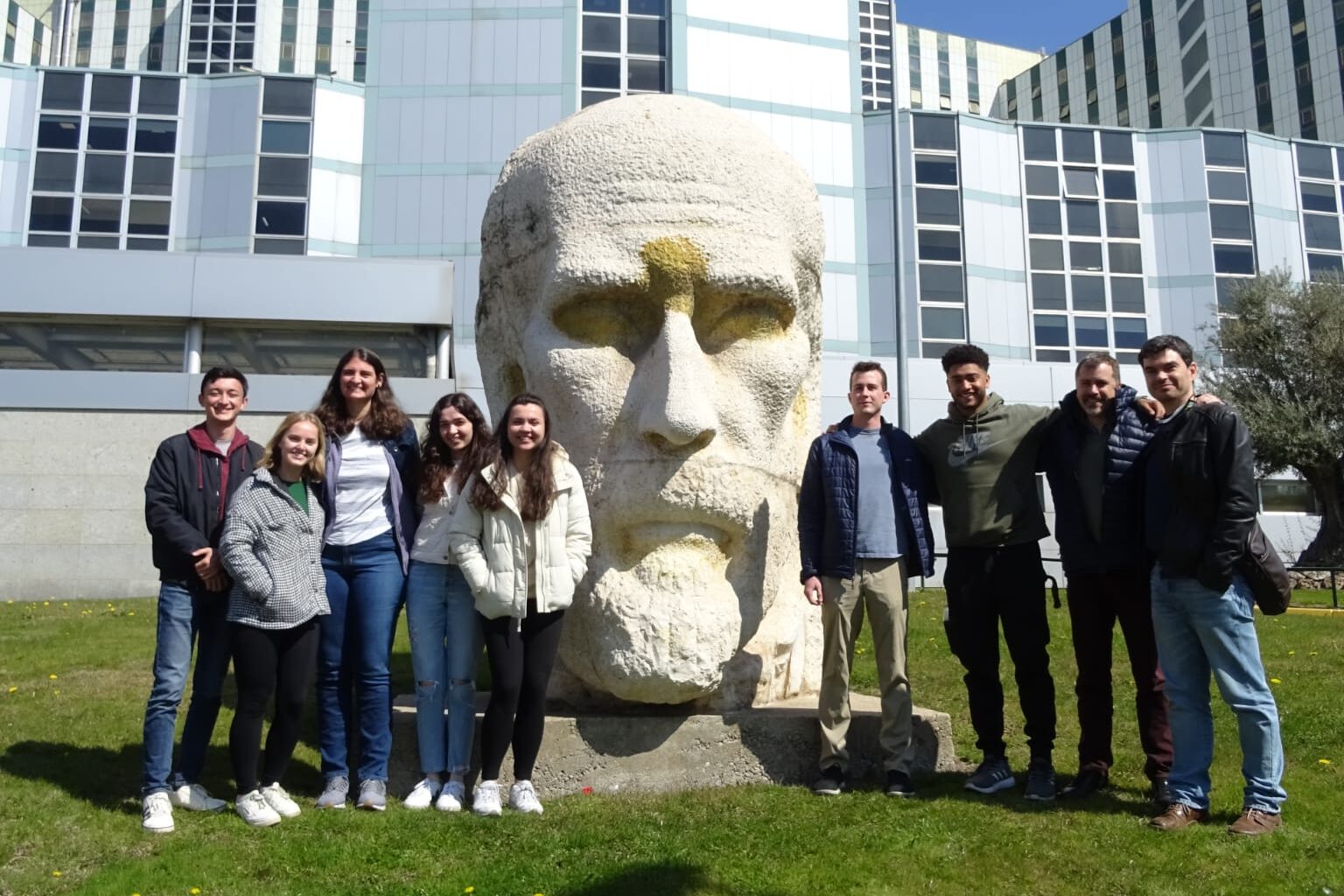Academics (neuro)
Students in the Salamanca Neuroscience Program typically take 4 courses during the semester in Salamanca + HMN 170.
HMN 170: Contemporary Spanish Experience (1.5h) is required and includes the group excursions to sites around Spain. This course is pass/fail and is taught by the Salamanca Cultural director.
The 4 remaining courses are chosen from the list and must include at least 1 Spanish course and either BIO 354 or BIO 363.

All courses except the Spanish course are taught in English. Spanish courses are offered at various levels.
Students with 5 semesters or more of Spanish may take SPA 328. Medical Spanish with the Immersion program students.
Courses are scheduled Monday through Thursday, leaving three-day weekends to explore the city or travel to nearby destinations.
The Salamanca Program follows the Class Attendance policy listed in the WF Bulletin:
While attendance is mandatory, in recognition of the fact that you may occasionally suffer minor illness or other conflicts, a maximum of two absences from classes, are permitted without any reduction in your grade…
- Each absence after the second will bring your attendance below 100% and will result in a decrease of two points on the final grade for the class.
- In the case of a documented hospitalization or serious prolonged illness or injury, the professor may provide accommodation. Send documentation of hospitalization / doctor’s multiple-day bed rest orders to your Academic Director, who will communicate with your professors.
- Absences from academic trips are not permitted. Each day (partial or complete) of absence from an academic trip will lower the final HMN 170 grade by 10 points.
- Tardiness may be considered absenteeism.
- Students missing 20% or more of total course hours may be removed from the course or the program (reviewed on a case-by-case basis).
Class changes once students have been registered for Salamanca courses are generally not permitted.
- An Add may be permitted if there is space in a class and the change will not enroll the student in more than 17 credit hours per semester.
- A Drop will be permitted only in the event that the student has discovered an error on his/her transcript since registering for the program abroad and a different course is needed to meet major/minor/concentration requirements. (documentation required).
- Students must remain enrolled in a minimum of 12 hours of locally-taught courses.
- Add/drop request form
Rules for pass/fail:
- Students are limited to electing to take one course (4h, maximum) per semester pass/fail.
- Courses used to fulfill core, quantitative reasoning, cultural diversity, major, minor, or certificate programs requirements may not be taken on a pass/fail basis unless they are only offered on that basis.
- The criteria for a passing grade for BIO 363, 354, 354L, 379, PSY 317, SPA 300C, and SPA 196 is a grade of C- in the course.
- The last day to change from grade mode to pass/fail mode is the drop date.
- The last day to change from pass/fail mode to grade mode is the Friday of the twelfth week of the semester.
- The request to take a course pass/fail must be initiated by a student in Workday. Approvals take longer in study abroad programs than on campus, so it is recommended that requests be submitted as early as possible.
- Spanish universities follow a different calendar of assessment. Daily homework checks and quizzes are less common than they are in the States.
- Although there are exceptions, courses generally require a midterm and a final and some written essays.
- Exams must be taken at the time established by University of Salamanca. Changes to the date or time of an exam will only be allowed in the event of a documented medical emergency, with prior permission from the Wake Forest Resident Professor/On-site Administrator (Javier) and the professor of the course.

- Professors will also evaluate your participation and attitude.
- You may get assistance from tutors or native speakers (for Spanish courses), but they are not to help you do assignments to be turned in for a grade; doing so will constitute an infraction of the HONOR CODE.
- Students may be asked to explain or reproduce, in person, any assignment that they turn in. Failure to do so may result in sanctions, including a grade of zero or reporting to the Honor Council.
Throughout the semester you are bound to note cultural differences in your Salamanca professors´ styles of teaching. This is part of the experience of studying abroad. However, just as your professors on campus articulate their expectations clearly, provide you with timely feedback, and grade your work fairly, so also will your professors in Salamanca.
If at some point you should have a complaint about a professor’s performance or grading, use the following procedure:
- As soon as possible and no later than fifteen days after the event, talk personally with or send a written message explaining the concern directly to the professor. Should you need assistance writing this message, your Resident Professor may be of help. (If your complaint regards the Resident Professor, move directly to step 2) The Resident Professor will not take a position or write a message for you, but s/he can help you find the vocabulary to communicate your complaint.
- If your complaint is not resolved, you may appeal to the Program Director for assistance. The Program Director will communicate with you and the professor, seek to understand your individual perspectives, reach a conclusion, and share it with you and the professor.
- If your complaint is still not resolved by these procedures, you should consult with the Office of Academic Advising for assistance.
- Finally, you may appeal to the Committee on Academic Affairs which will study the matter, solicit input from all parties, and reach a final decision concerning resolution.
Again, a complaint should be directed as soon as possible to the professor whose actions or inactions have given rise to the problem. In no case will a complaint be considered later than fifteen days after the event.”

WFU Honor Code: https://studentconduct.wfu.edu/undergraduate-student-handbook-2/#20230228212512
Honor Code
The Wake Forest Undergraduate Honor Code prohibits “plagiarism, stealing, cheating, and deception.” In academic terms, this means turning in, as your own, wording, text, or ideas that are not your own.
To avoid plagiarizing, cite your sources when quoting, paraphrasing, or summarizing works (print or online) by other authors. To avoid cheating and deception, do not use tutors, friends, collaborators, contractors, translators, grammar checks, or artificial intelligence generators for work that must be your own.
Any sign of plagiarism, stealing, cheating, or deception will be regarded as a violation of the Honor Code and will be awarded a grade of 0 and submission to the Judicial Council.
Wake Forest will cover all textbooks. You will be notified when and where to collect them.
Find the link for your USAL Gmail account here: http://gmail.usal.es/
- Your USAL account username will be your email address (example: i_c000000@usal.es; you can find yours below your picture on your USAL ID card).
- Your passport number will be your password.
- Use your USAL credentials to access the USAL Canvas, called STUDIUM can be accessed here with http://studium.usal.es/
Make sure that you log into your USAL account to activate it. It must be done at least once before classes start. Please let us know immediately if you are unable to log in.


